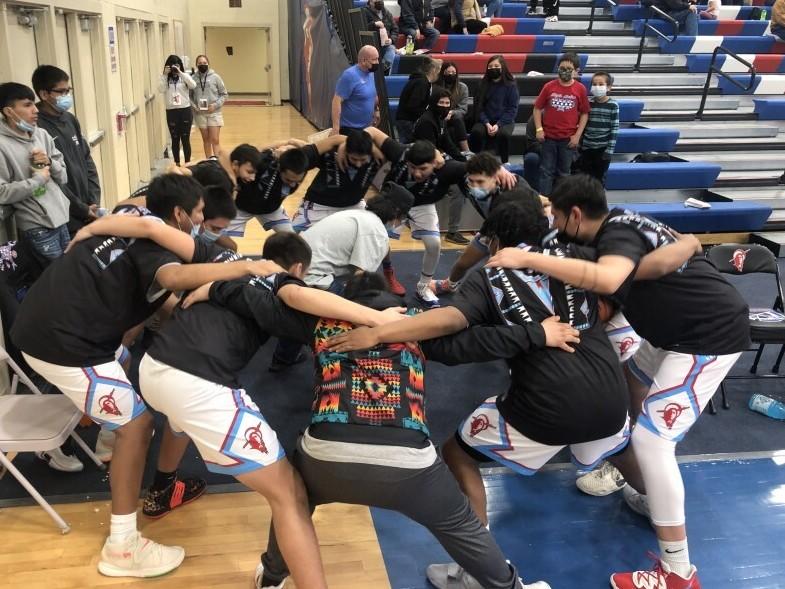Section Branding
Header Content
This reservation has Wyoming's strictest COVID-19 rules. Student athletes are glad
Primary Content
Student athletes on the Wind River Reservation in Wyoming are grateful mask mandates aren't going away there, even as they continue to fall away across the country. They feel like the mandate has helped keep them healthy and competing as other schools across the state have had to cancel games because of covid infections.
On a recent basketball game night at Wyoming Indian High School in the reservation town of Ethete, the announcer introduces the hometown Chiefs in a mix of English and Arapaho.
The gym is usually packed, but this year because of COVID-19 protocols the crowds have been reduced.
The Wind River Reservation, home to the Eastern Shoshone and Northern Arapaho tribes, has had a mask mandate since early in the pandemic. That's unusual in Wyoming, a conservative state where COVID-19 restrictions are not popular.
Chiefs team captain Videl C'Bearing, a senior, says being able to play ball has really helped him get through the pandemic.
"You need physical activity to help you get your mind straight. And that's what I think about basketball, it's therapy. Like when I'm mad, or whatever, my just first thought is, 'Man, I'm gonna go shoot around somewhere,' " he says.
Wyoming Indian Basketball Coach Craig Ferris graduated from the school in 1995, played college basketball and came back to coach at his old high school. He's been the coach here for 18 years.
He's a fan of the mask mandate.
"We've heard of a couple of teams that canceled games through the weekend because they've had no real mask mandate, but have positives in their school and they've had to basically shut the whole team down," he says.
COVID-19 protocols on the Wind River are the strictest across Wyoming
The tribes say that the reservation's vaccination rate is around 70-80%. Wyoming as a whole is at 50%, one of the lowest in the U.S. Ferris says a majority of student athletes at Wyoming Indian are vaccinated, and they're also tested every 10 days.
"It's allowed us to actually complete a season without canceling any games. And I know we've been short players here and there, but we've haven't had to cancel any games," he says.
Masks are not required during games, but the girls basketball team here has kept theirs on during competition throughout the pandemic.
"To my knowledge, they're the only ones that are still wearing them while they're competing," says Ron Laird, commissioner for the Wyoming High School Activities Association.
The Wyoming Indian girls team has won the last three state basketball championships in a row, and could again this year in a few weeks.
Laird says that COVID-19 protocols vary across Wyoming, but they are strictest on the Wind River.
Northern Arapaho chairman Jordan Dresser says lax COVID protocols in other places in the state are one reason they're maintaining the mask mandate on the reservation.
"A few weeks ago, we had the surge from the Omicron. And you know, we reached pretty high numbers like six, 700 individuals tested positive, but we only had like one hospitalization," he says.
Dresser says that the reservation's mask mandate isn't going anywhere.
"Unfortunately, as soon as you step off, the reservation is when you get the people who are majority are not vaccinated. So I just see, in theory, the mask mandate, something that is good for a while," he says.
COVID-19 has made the last couple of seasons challenging, but hasn't changed captain Videl C'Bearing's goals for the future.
"One of my dreams is to play college basketball, that's what I really want, you know hopefully I can go somewhere and play. And just come back here and pretty much do what my coaches do," he says.
The tribes on Wind River also lowered building occupancy, required schools to provide virtual learning for students to stay home from school, and required anyone working with children on the Wind River to get vaccinated.
Copyright 2022 Wyoming Public Radio. To see more, visit Wyoming Public Radio.
Bottom Content

